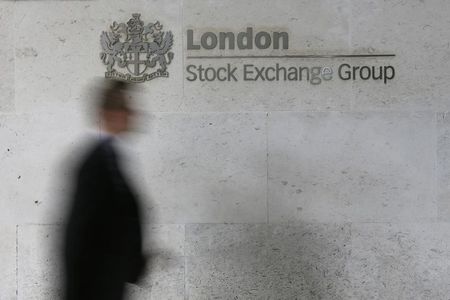By Lionel Laurent and Tricia Wright
LONDON (Reuters) - Profit warnings and share-price slides at top UK companies this week have delivered a wake-up call to investors over Britain's persistent valuation premium relative to the rest of Europe.
While the UK is no slouch when it comes to economic growth and earnings recovery - and looks poised to become the first big economy post-crisis to hike interest rates - the strong negative reaction to Tesco and Tate & Lyle's profit warnings since Monday suggest investor patience is wearing thin.
UK stocks are currently trading at a 37 percent price-to-book premium relative to the rest of Europe, compared with a historical average premium of 17 percent, Societe Generale strategist Roland Kaloyan said, leaving little room for outsized bumps along the road to recovery.
And with positive earnings upgrades on UK companies already lagging Europe's – partly a reflection of sector-specific woes such as London-listed miners and UK food retail - HSBC strategist Robert Parkes said investor sentiment was turning more positive about cheaper assets across the Channel.
"The UK did get to quite a premium during the euro zone crisis ... The market has been de-rating but we still don't think it's cheap enough," said Parkes. "The key point is that the UK is lagging in terms of earnings revisions."
Strategists see scope for further outperformance by continental Europe, where banks and exporters in particular are benefiting from increased market expectations that the European Central Bank will eventually provide a substantial monetary stimulus to dodge the threat of deflation.
At least some of the UK's premium is linked to hopes for corporate deal-making, which took a hit on Tuesday after new U.S. tax rules dented the takeover appeal of healthcare firms such as Shire and AstraZeneca.
The FTSE 100 index is down 1.5 percent year-to-date, against a 4.2 percent rise for the pan-European FTSEurofirst 300.
COMPANY WOES
With a UK relief rally over Scotland's vote to reject independence now firmly in the rear-view mirror, investor attention is expected to shift back to issues such as the fragility of Britain's long boom in cheap credit, which has given a fillip to consumer stocks.
To be sure, some investors were reluctant to draw parallels between the precise reasons behind profit warnings at Tesco and Tate & Lyle, saying they were company-specific.
But the strong share-price reactions have highlighted how investor faith in selected UK bellwethers is eroding.
Tesco shares were trading at their lowest level for over a decade on Tuesday after the world's No. 3 retailer admitted to accounting mistakes. On Monday it cut its profit outlook for the third time in two months.
Tesco had been the darling of the retail sector during two decades of uninterrupted earnings growth until it lost UK market share to fast-growing German discounters Aldi and Lidl as well as to upmarket rivals Waitrose and Marks & Spencer.
Food-ingredients specialist Tate & Lyle, meanwhile, said lingering supply chain issues and a more competitive market for its Splenda sucralose sweetener were to blame for a cut in its profit forecasts. Shares have slumped 16.5 percent to levels not seen in three years.
"Unlike perhaps earlier in this cycle, we haven't got a nice warm comfort blanket in terms of valuation buffer and risk premium around us, which characterised maybe 2012 and much of 2013," said Ian Richards, global head of equity strategy at Exane BNP Paribas.

"Anything which threatens that delivery is liable to see a significant setback in terms of pricing trend."
(Additional reporting by Blaise Robinson, Sudip Kar-Gupta and Atul Prakash; Editing by Gareth Jones)
